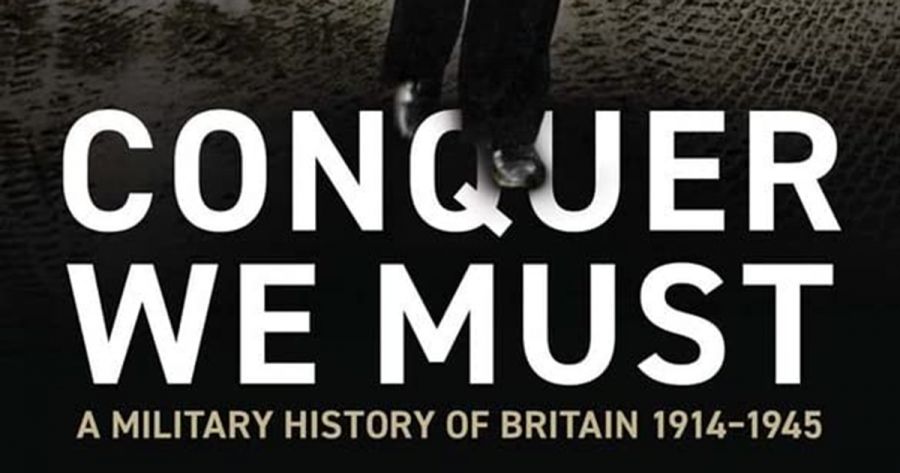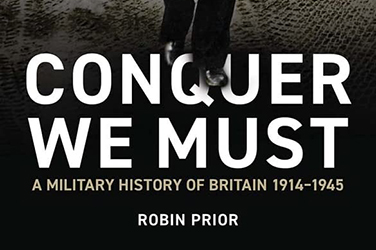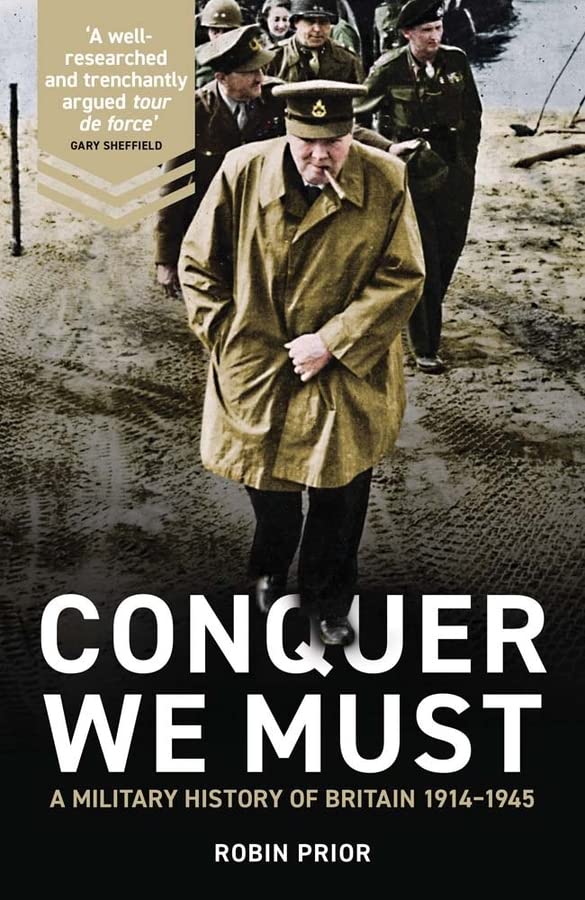
- Free Article: No
- Contents Category: Military History
- Review Article: Yes
- Article Title: Britain in and out of war
- Article Subtitle: The political-military interface
- Online Only: No
- Custom Highlight Text:
Robin Prior opens this monumental military history by stating that Britain was the only power on the Allied side in both world wars to fight the regimes of Kaiser Wilhelm II’s Germany, Nazi Germany, fascist Italy, and imperialist Japan ‘from beginning to end’. Some might quibble. Was not 1937 the beginning of the war against Japan? But few could doubt that Britain’s sustained war effort in both world wars was remarkable. Even though victory often seemed uncertain and the cost in casualties, human grief, economic dislocation, and financial ruin was immense, the nation continued to exhibit ‘stern resolve’, believing that ‘conquer we must’.
- Featured Image (400px * 250px):

- Alt Tag (Featured Image): Joan Beaumont reviews 'Conquer We Must: A military history of Britain 1914–1945' by Robin Prior
- Book 1 Title: Conquer We Must
- Book 1 Subtitle: A military history of Britain 1914–1945
- Book 1 Biblio: Yale University Press, US$40 hb, 803 pp
- Book 1 Cover Small (400 x 600):

- Book 1 Cover (800 x 1200):

These intriguing questions are explored largely through an analysis of the strategic debates in both world wars and the battles that Britain fought on land, sea, and air. It is the details of fighting, Prior claims, that enable us to examine ‘how well thought out the original decisions at the [high-level decision-making] summit were, what price had to be paid, and whether the politicians had the will or the means of intervening if these military operations seemed to be going wrong’.
This approach will satisfy any reader seeking authoritative and accessible syntheses of the strategy, tactics, and technology of the operations that British forces fought. As is his wont, Prior is the master of pithy judgements and feisty critiques of politicians and commanders. The first battle at Bullecourt in 1917, in which Australian troops were almost thrown away, he describes as ‘one of the most miserably conceived operations ever conducted on the Western Front’. Yet these battle accounts, tours de force though they are, tend often to relegate the theme of the political-military interface to the margins.
Prior returns to this explicitly in his concluding chapter: ‘If there is a general view about politicians and the military in Britain in two world wars,’ he writes, ‘it is this: in the First World War politicians presided over untrammelled slaughter on the Western Front as they let the military go their own way. In the Second World War, Churchill in particular interfered too much in military matters and was only kept on the straight and narrow by frequent interventions by strong-willed generals such as [Chief of the Imperial General Staff] Alan Brooke. It is possible now to say that both these views are caricatures while containing some elements of truth.’
Unsurprisingly, Prior reserves some of his harshest judgements for the British politicians of World War I. In 1916 and 1917 particularly, they failed to rein in the commander of the British Army on the Western Front, Field Marshal Sir Douglas Haig, as he persisted with the battles of the Somme and 3rd Ypres (Passchendaele) in the face of unprecedented carnage. The latter, Prior concludes, was one of the most lamentable lapses in civilian control of the military in modern British history.
Yet Prior leaves us with the unresolved mystery as to why Lloyd George, who was vocal in his criticism of attrition, abdicated responsibility in 1917 (he reclaimed some control in 1918 with the appointment of the French Marshal Ferdinand Foch as supreme commander of Allied forces). Prior can only suggest that in the end the civilians, who knew that France was the only front that mattered, did not have the internal fortitude to impose their will on the military in such a vital area. Or perhaps Lloyd George and at least some of his colleagues hankered, like Haig, for that ever-elusive knockout blow.
Prior’s judgement of Churchill in World War II is far more generous, though not always so. Much of the account of this war considers the often bitter debates between the British and the Americans about which theatre of operations should be given priority. The real tensions in this war were not within the British political and military command but rather between the British leaders and their trans-Atlantic counterparts. Although the United States became the dominant partner as the war progressed, reducing Britain’s influence over grand strategy, Prior credits Churchill and Brooke with the major achievement of warding off American demands for a second front in 1942. While there might be various views about the viability of a cross-Channel attack in 1943, Prior concludes that an attempted invasion of France in 1942 would almost certainly have failed ‘with consequences that are difficult to imagine’. It is hard to disagree.
Prior also defends the British against charges that they pursued the strategy of war in Italy and the Mediterranean in 1943–44 because of imperialistic designs to consolidate British power in that region at the end of the war. Rather, they fought the Axis powers here because they thought they had a decent chance of beating them in this theatre.
Any book of this scale and ambition will necessarily leave questions unanswered and contested. Take the British Prime Minister Neville Chamberlain and appeasement in the late 1930s. Prior adopts the traditional ‘Guilty Men’ approach that the Munich agreement, which ceded the Sudetenland to Germany, was both ‘morally repugnant and strategically illiterate’. But there is an alternative and persuasive scholarship that argues that the British economy was not geared for war in 1938; and that appeasement bought Britain critically important years in which vital munitions, such as the Spitfire and Hurricane, came off the production line.
Ultimately, Prior concludes that the two world wars tell us that in a democracy the primacy of politics is essential. Moreover, a little learning by civilian leaders of the art of the military is a good thing. Churchill was able to provide effective leadership in World War II because he was sufficiently schooled in military matters that he had confidence dealing with the military. That said, in the end most civilians lack the depth of knowledge of military matters to be able to intervene effectively when things on the battlefield go wrong.
Beyond this, Prior claims that democratic politicians are as capable as any of waging war with the ruthlessness required to combat totalitarian states. The strategic bombing offensive against Germany that killed between 300,000 and 600,000 civilians provides manifest evidence of this.
So far, so good. But Prior also concludes that Britain’s case suggests that, where politicians acted with the support of their populations, they were able to mobilise their states more effectively to fight protracted wars than any dictatorship. Really? How, then, do we explain the remarkable performance of the German army till the end of 1944 at least, and the resilience of the German population as their cities were laid waste? Even more, how do we account for the resistance of the peoples of the Stalinist Soviet Union, of whom perhaps twenty-seven million died? Without the Eastern front, the British would never have defeated Nazi Germany, no matter how firm their resolve to conquer.


Comments powered by CComment